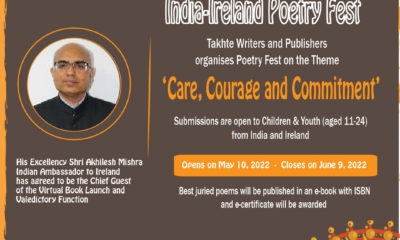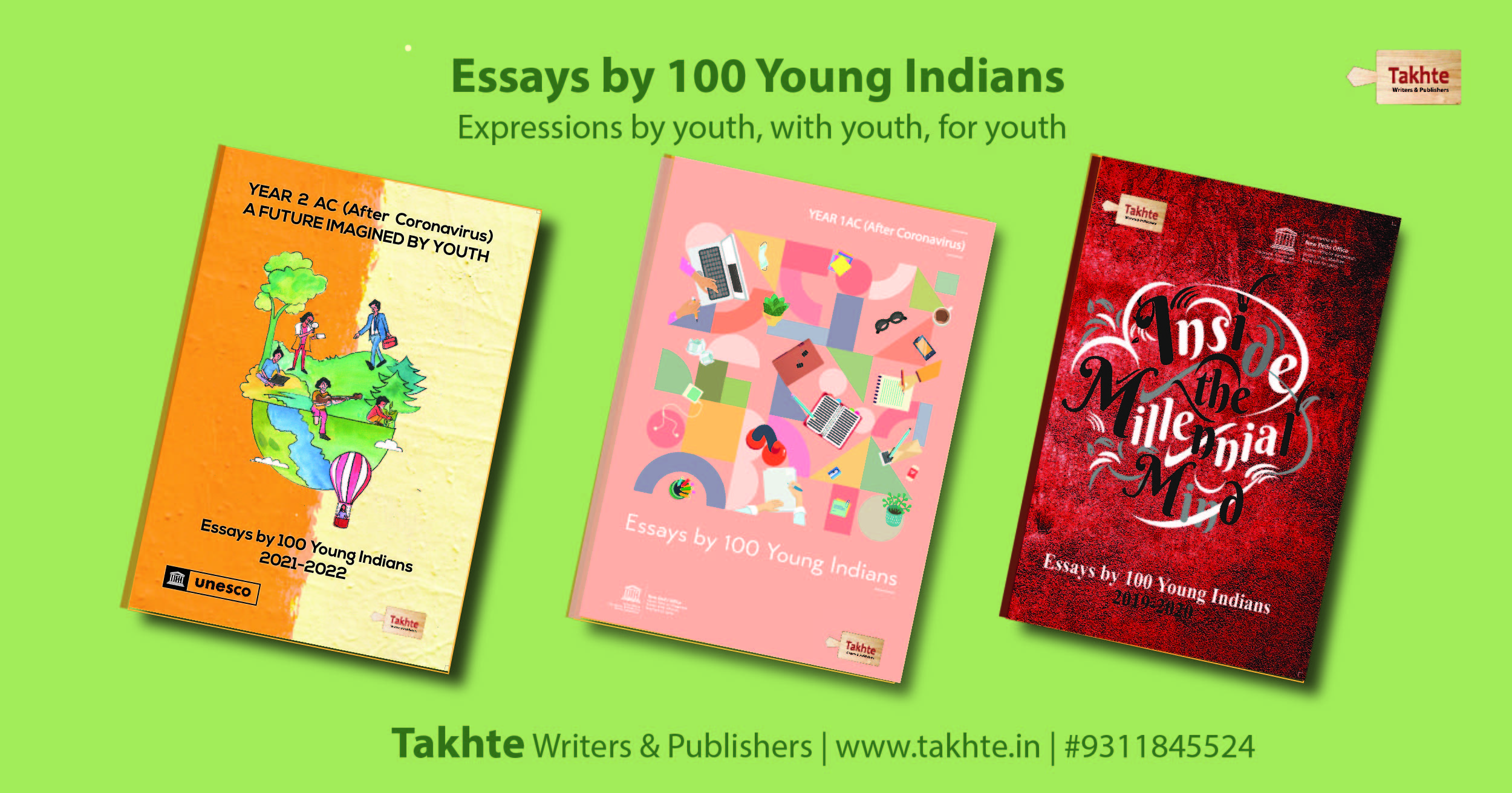Simply Express
The Free-Hearted Cameraman

Chaitanyamoi Chetia
St. Joseph’s High School, Moranhat
It was the best time to go for an elephant safari on a jeep for the tourists. Joy and his parents had already set out in the early morning, and their destination was at the Kaziranga National Park. All the resorts located there were beautiful to look at, but Joy’s father preferred the alternatives recommended by the Assam Tourism Development Corporation. After much effort, Joy’s father had been able to book one double-bedded room having a balcony and that also many weeks before Joy’s annual examination started.
His mother packed all the necessary and requisites for their stay there. She had been giving a strict vigil to the wrapped things like the mobile phone and the charger because it was their only camera mobile through which they would capture pictures; warm clothes and his father’s medicines prescribed by the doctor were also packed.
His parents’ curiosity for purchasing one new camera abated from their mind when they had lost a steady SLR camera at a children park due to their negligence when Joy had been a small boy.
They checked in at the reception desk and signed in their names in the book. Joy took his bath and changed his casual attires, and started enjoying cartoon films on the mobile.
His mother said, “The battery life of a mobile is not a day’s worth. Get it fully charged; instead of the mobile, you can enjoy the TV while reclining on a chair.”
Joy answered, “I will keep only after watching five minutes, Mother.”
They took their lunch at the banquet hall of the resort and came out: the manager of the resort was a nice man who told that the landscape of the Bagori range at the Kaziranga National Park spreads in the western range of the wild forest and also considered the best zone for wildlife sighting. In fact, the manager suggested that they should prefer that range.
Joy’s parents took the mobile phones without wasting any time, and Joy took a mineral water bottle and headed for the jeep safari. Innumerable tourists with different types and sizes of cameras were seen walking here and there with smiles on their face near the booking counter organised by the forest officials; some children of Joy’s age were also seen hopping and jumping in joy. In an open hooded jeep, they took their seat, and the jeep drove towards the Bagori range, and it stopped for a while at the security checkpoint. Many jeeps were parked there, and tourists from different parts of the globe were wandering and taking photos near the timber plank standing straight and on the plank written – KAZIRANGA.
Joy and his parents got down to click photos, and Joy’s parents were looking cheerful. “Joy, take us a photo near this timber plank,” said his father.
Joy struggled a great many times to click a photo, but every time he attempted, he failed. Then came his mother and tried through her mobile and the same thing happened.
“Alas! what will happen now,” Joy wandered.
His mother said desperately, “Joy, arriving here, I warned you to give a wide berth to mobile, but you didn’t pay heed to my saying. Now, we failed to click even a single photo for a lifetime memory. Now what on earth are you going to do!”
Joy felt like he was between Scylla and Charybdis, for the camera mobile had failed. Just then, he approached a tourist who had a camera in his hand.
“Uncle, you are looking wonderful with your Van Dyke style beard,” said Joy. “Would you kindly take a photo for us?”
With the camera in his hand, the man said, “Of course, take your position and tell your parents to come; after clicking, I shall transfer it to your mobile.”
“The man’s photographic etiquette suggests he must be a professional photographer,” Joy’s mother told his father. “Also, look at his white beard and the blue denim attires he is putting on.”
“A full goatee with detached moustache and his facial feature highlights he is from a foreign country,” his father said.
The Van Dyke style white beard man also wondered himself, “This boy’s eagerness for photography shows he is an aspiring photographer, though he has no camera in his hand.”
The security guards in uniform checked the booking tickets of the tourists. Barring cameras and mobile phones, edible things and water bottle were not allowed to take inside. Slowly one by one, all the registered tourist jeeps went inside the dense jungle.
Joy saw from a close range the water buffaloes and one-horned rhinoceros everywhere and a herd of deer and wild elephants and many migratory birds.
Joy’s father inquired, “What was the problem with the mobile phone that we could not click a single photo?”
Joy’s mother answered, “I asked Joy to limit himself in enjoying the mobile phone and be careful so that the battery charge does not hit zero; Joy did not listen.”
His father took the matter lightly and said, “Our destination choice was a nice one. There was a great feeling of camaraderie and togetherness which developed in the tourist spot.”
His father again added, “Look at the wet alluvial tall grassland fringed with tall reeds and the beautiful one-horned rhinoceros.”
While Joy was watching the rhinoceros grazing and wallowing, he was in jubilation and excessive joy when he saw a few security vehicles escorting British Royal couple, Prince William and Princess Kate Middleton, the Duke and Duchess of Cambridge visiting the Kaziranga National Park at the Bagori range in an open jeep. Joy couldn’t believe his eyes; he felt like he was looking at the Taj Mahal.
The sun had set, and they arrived at their resort. Joy saw some of the boys at the tourist spot playing and rejoicing in the ground under the bright halogen lights. On the room’s balcony, reclining on a chair, Joy’s mother was conversing with somebody through her mobile phone. She told Joy to go down below to the ground and play and get himself acquainted with them, for the next day after the elephant safari, they would check out. Joy was sad and remorseful that no pictures could be clicked through the mobile.
“Mother, I am reluctant to go down,” he said. Now I must get the battery charged to the full so that no obstacle creeps up tomorrow in the elephant safari when my father would try to capture any picture.”
Just then, a concierge of the resort came to the room to give the message that the next day morning, they would have to arrive at the Kohora range for the elephant safari. When asked about the time, the concierge replied to arrive early in the morning: and were told that the Kohora range would be about a few kilometres from the resort.
He continued, “There would be dense fog outside in the morning, so it would be better if you carry warm clothes with you.”
In the morning, Joy and his parents set out for the elephant safari. Joy handed over the mobile phone to his father so that when necessary, his father could click pictures. There was fog everywhere.
Joy said, “Father, for me, it is a different experience.”
With the mobile battery fully charged, Joy’s father clicked a sleeping fawn who was fast asleep; the fawn awoke and ran away immediately; the fawn’s amazing scene made everybody laugh and while running away even the dead fallen leaves and the twigs made a sound.
Joy shouted in ecstasy, pointing to the fawn, “Run, run.”
Joy’s father captured many photos of this fawn. Sitting on the elephant and taking photos made Joy’s father jubilant.
Joy said to himself, “My father is feeling so happy now; he captured without any difficulties many animals from different angles.”
Joy’s mother said, “We should be thankful to the mahout (the elephant rider who controls the elephant), because the latter had made the elephant move by the side of the sleeping fawn.”
They returned to the resort. They had breakfast, and Joy’s father took the prescribed medicine which was wrapped in a small paper. The receptionist and all other members there requested them to visit again. Joy and his parents got into their car. While coming out of the tourist gate, Joy again saw many new tourists congregating at the booking office and engrossed in talking with one another. Most of them were moving everywhere with different types of cameras in their hands.
One tourist approached a man, shook hands, and said, “What camera are you carrying in your arms?”
The man answered, “This is a DSLR camera.”
One lady came to one woman and said, looking at the camera, “This camera is looking nice; what camera is this!”
She answered, “Oh! This is a mirrorless camera.”
Joy looked at his father’s face and he could understand his father was feeling elated.
Joy said to himself, “I want to see my father in this way in a smiling face always. I pledge that I shall never again disturb my father’s mobile phone anymore. The photos that father captured during the elephant safari shall always remain a great memory for my parents as well as to me.”
His mother joyfully said, “Incredible!” looking at the photos transferred from the camera clicked near the timber plank by the white beard man to her mobile phone.
Simply Express
Literary Writers Can Help Prevent Child Abuse

By Goldie Kasturia
The literary writings give textual acknowledgement to the social happenings and issues and effectively contextualise the social dichotomy, bringing forth the belief that a positive change can be envisioned if the communal conscience is awakened to evil acts. According to the statistics and research, child abuse is a significant problem in our country. It is a critical veracity that children are mistreated every day by adults meant to love and care for them. Literary writings can contribute to overcoming the gradual decline. Through it, change is necessitated regarding the social incidents that are grimly plunging deep morally and ethically and affecting the innocent population physically and mentally. Writings should discuss more, allowing children to blossom and experience the joys of childhood.
Literary authors have social and political responsibilities. As they are mind makers and mind changers, their works can profoundly impact and encourage a sense of responsibility in avid readers’ minds. Moreover, literature is predominantly swayed by society and reflects it. It is imperative for sustained growth and reformed social values. Child abuse should not be neglected and overlooked concern but rather a forayed issue as both rural and urbanites are inflicted. Literary writers should achieve the objective of tapering the widespread social problem of child abuse by forcefully discussing it in their work. The literary community should support addressing the brutal reality sharply and severely.
Child incest has no parameters as it happens across nationalities, castes, classes, and ages. However, we still need to understand the impact of severe and despicable crimes against innocent children. These victims carry the scars all their lives, though some people are still in denial about it. Monsoon Wedding (2001), the popular movie released by Canadian producer/director Mira Nair, depicts the crime in an upper-class family. This is taken as a widespread problem in Indian society.
Child sexual abuse is, unfortunately, witnessing a high rise. Even the National Human Rights Commission, in its report on Children in India & Their Rights, has categorically listed its measures adopted in administering media, both print and electronic, in addressing child sexual abuse. They have taken out ‘A Guidebook for the Media on Sexual Violence against Children.’
Literary writers should profoundly take the responsibility of informing their readers because then the whole community will be enlightened. Third-generation English Indian writers have raised child abuse in their writings, but the need is to focus more on it. Contemporary realistic novels for children are dreadful for readers of all ages when child abuse is a severe concern in the story. It is a known fact that childhood is cherished and full of fun, amusement, and freedom. The books on quarrels, trivial school problems, or the rivalry between friends or siblings are common. However, the writers discussing the serious issues children undergo, such as bullying, maltreatment, and problems related to the divorce of parents or their deaths, is uncommon. Fictions with these issues can be crucial, as such literary works are potent conveyors of messages; they can be inspiring, encouraging, informational, and potentially life-changing for abused children. Few writers have focused on the consequences of the indifference of people towards violence against the child, while some have depicted how the abused child feels and how he/she can overcome the problems. Both adults and children should read realistic novels that emphasise the adults’ role in addressing issues related to child abuse.
Simply Express
Child Abuse in Indian English Literature

By Goldie Kasturia
Indian English literature has radically contributed to world literature. The Indian English writing is both innate and imbibed, as it has come to the fore by coming across the East and the West. The literature of a country where it originated is closely related to the traditions, languages, cultural heritage, histories, and experiences; however, Indian English literature is more associated with a colonial encounter, as a critic has remarked: “The literature written in English has an altogether different history and is linked with the global process of colonization. However, it has also grown out of an Indian ethos and is responsive to the changing conceptions of Indian nationalism and self-interest.”
Litterateurs powerfully focus on political, social, and economic struggles. Writers from the earliest stages of Indian English writing like Bankim Chandra Chattopadhyay, Sri Aurobindo, and others were treating their writing as a document for social change and as a weapon of the nationalistic struggle. This idea was taken up by the early greats of Indian English fiction, namely Mulk Raj Anand, R.K. Narayan, and others who used their work as an attempt to portray social truths and as a vehicle of change and reform.
The Indian English novel in its present state has overcome the clichés, emerged from the limited sphere, become confident, and attained maturity and a certain universal status. The Indian writers of the post-independence era adopted English as a tool and in its varied innuendoes to express widely differing cultural experiences. In works like Rushdie’s Midnight’s Children and Arundhuti Roy’s The God of Small Things, the creative and imaginative use of the language of the coloniser shows how these writers use the language as a dynamic medium to explore the complex Indian reality.
The third generation’s Indian writings in English have enlightened the literature with its quality and vividness[i]. And have concentrated their themes around social content—particularly in its representation of the conflict between the individual and the community. Although the writings profoundly deal with regionalism, they crossed the natural boundaries with universal themes, including feminine subjects, science and technologies, explorative writings, and much more. Under socio-issues, child sexual abuse finds an elaborative mention. Further, dealing with child incest, the writings throw more light on the effects of forced sexual relations on the individual’s psyche, which gets intensified with time.
When the renowned poet of English literature P.B. Shelly wrote, “If winter comes can spring be far behind,” he was not possibly talking only about the change of seasons but also about the fact that change is the law of nature and it has to happen sooner or later, and yes, sometimes it comes with a heavy price. Children and adolescents, irrespective of their race, culture, or economic status, appear to be at approximately equal risk for sexual victimisation [ii]. Child sexual abuse is outlawed nearly everywhere in the world, generally with severe criminal penalties, including, in some jurisdictions, life imprisonment or capital punishment. An adult’s sexual intercourse with a child below the legal age of consent is defined as statutory rape based on the principle that a child is not capable of consent and that any apparent consent by a child is not considered to be legal consent. Child Sexual abuse is engaging a child in any sexual activity that he/she does not understand, cannot give informed consent for, or is not physically, mentally, or emotionally prepared for. This includes using a child for pornography, sexual materials, prostitution and unlawful sexual practices. The United Nations Convention on the Rights of the Child (CRC) is an international treaty that legally obliges states to protect children’s rights. Articles 34 and 35 of the CRC require states to protect children from all forms of sexual exploitation and sexual abuse. Accurate statistics on the prevalence of child and adolescent sexual abuse are difficult to collect because of problems of underreporting and the lack of one definition of what constitutes such abuse. Nineteen percent of the world’s children live in India, which constitutes 42 percent of India’s total population. A total of 33,098 cases of sexual abuse in children were reported in the nation during the year 2011 when compared to 26,694 reported in 2010, which increased by 24%. It is estimated by the government that 40% of India’s children are susceptible to threats like being homeless, trafficking, drug abuse, forced labour, and crime. In India, every second child is being exposed to one or the other form of sexual abuse and every fifth child faces critical forms of it. [iii] The effects of child sexual abuse can include depression, post-traumatic stress disorder, anxiety, propensity to further victimization in adulthood, physical injury to the child, and many other problems. Sexual abuse by a family member is a form of incest and can result in more serious and long-term psychological trauma, especially in the case of parental incest. In 2007, the Ministry of Women and Child Development published the ‘Study on Child Abuse: India 2007’. The study’s main findings suggest that 53.22% of children reported having faced sexual abuse. Among them, 52.94% were boys and 47.06% were girls. The ‘Protection of Children against Sexual Offences Bill, 2011’ was passed by the Indian Parliament on May 22, 2012
Further, the U.S. Department of Health and Human Services (2008) claims, “While physical injuries may or may not be immediately visible, abuse and neglect can have consequences for children, families, and society that last lifetimes… The impact of child abuse and neglect is often discussed in terms of physical, psychological, behavioural, and societal consequences. In reality, however, it is impossible to separate them completely. Physical consequences, such as damage to a child’s growing brain, can have psychological implications, such as cognitive. Â delays or emotional difficulties. Psychological problems often manifest as high-risk behaviours, depression, and anxiety…”
If we consider some of the literary works of eminent writers like Akhil Sharma’s ‘Obedient Father’, which unfolds the story of a corrupt government official who repeatedly molests his daughter. Ram Karan, the antihero of Akhil Sharma’s novel, “An Obedient Father,” molested and raped his daughter when she was 12 years old. Ram would prefer that this skeleton stay in the closet, but now that his recently widowed daughter Anita and 8-year-old granddaughter Asha, have moved into his tiny flat, he’s somewhat short on closet space. This becomes especially difficult when the daughter catches her father developing an eye for his granddaughter. The close circle of relatives realises the need for Anita to leave her father’s house for her well-being and the safety of her daughter, but they also admit that homes “don’t grow on trees.” Literature reviews show that domestic violence takes on many forms, and here has prodded the author to focus on one of its many dimensions, and that is child abuse. The author categorically captures the sequences of how a child thinks that the happenings are circumstantial of her faults and relatively exposes the abuser’s tactics of domination by fear.
Mira Nair’s ‘Summer’ echoes Sharma’s focus on incestuous sexual abuse of children and challenges the silence that often protects the abuser. [iv] Arundhati Roy’s ‘God of Small Things’ is one of the most memorable and haunting books written in an innovative style [v]. A landmark in Indian English is not only for the celebration of the human spirit against cruelty and suffering but for the interesting manner in which the local is interwoven with the global. It discusses the abuse, exploitation, and neglect of girls and their rights in Indian society and how traumatic childhood experiences affect the perspective of a person towards life.
Child abuse is a major problem in our world today. It is a very sobering reality that children are being abused every day by adults who are meant to love and care for them. Along with the physical damage that is being done to children, there are also equally devastating emotional wounds created by harsh words or neglect.
[i] https://www.arcjournals.org/pdfs/ijsell/v3-i12/7.pdf
[ii] https://www.omicsonline.org/open-access/trace-evidence-analysis-in-a-child-sexual-abuse-case–silence-dares-to-speak-2157-7145-1000S4-001.php?aid=62197
[iii] https://www.ncbi.nlm.nih.gov/pmc/articles/PMC4311357/
[iv]http://www.academia.edu/9129499/The_Taboo_in_Indian_Literature_in_English_Expanded_Ways_of_Writing_and_Reading_Indianness_in_Essays_on_English_Language_Writers_from_Mahmoet_to_Rushdie_
[v] http://shodhganga.inflibnet.ac.in/bitstream/10603/67552/8/08_chapter%202.pdf
Photo courtesy: Artyom Kabajev on Unsplash
Simply Express
The pool in my backyard

Avni Singh
Podar World School Sama, Vadodara
My dad’s ever-changing job made us live almost everywhere except in India, our home country. We visited our extended family in India during the holidays, especially Varanasi, my hometown; they took us to the great river, the Ganges. The very first time when I travelled to the ghats (the steps leading to the river), I was excited to behold a spectacular sight of the river that takes away our sins with it. The Ganges, thronged by people from all corners of the subcontinent, serve as a water source for hundreds of villages and cities. I had heard several stories of the holy river from my grandparents. My cousins often bathed in it like a pool in our backyard.
I was utterly stunned and saddened to see the sight of the river. It was bursting with plastic bottles, flowers, polythene packets, and things I possibly could not describe. We returned without touching the water. Distraught with the thought of how a river considered holy, to be in such a state? I imagined that no one had tried to clean it up. Researching on it I found that Ganga Action Plan (GAP), launched in 1986, had tried cleaning it but did not achieve its high goals of preventing industries and sewage lines from polluting the river. So, during our visits in the later years, we just visited the Ganga as a ritual. I learned from my parents that the government had launched the Namami Gange program in 2014 to clean the river, and I hoped it would succeed.
The COVID-19 pandemic brought us back to India in 2020. Our relatives said that the Ganges looked cleaner as most industries were closed during the lockdown. There was a buzz in town that though COVID-19 made us suffer, it cleaned the river naturally. The river certainly looked clean from the outside. However, I had my doubts. So, I surfed online and came across reports of NGOs that work for cleaning the Ganges. They conduct water quality tests often and the recent results were shocking. The main reason for the pollution is untreated sewage water disposal into the river. The industrial wastes, leftovers due to religious activities, and land pollution runoff into the river add to the low water quality. Thus the river is not wholly cleaned. I am not proud of having a pool in my backyard but ashamed of not making any efforts to clean the great river that gives lives to millions of living beings.
Well, logically, after reading about the faecal material in the water, I had no intention of going into it. However, when we made a trip to the ghat this time, everyone except me was inside the water. As I watched, a man got in the knee-deep water and spit out a huge mouthful of well-chewed tobacco. My family watched this and rushed out of the water, not minding the cold at all. Then, he brushed his teeth and gargled in the same water. Finally, he bathed in it and worshipped the same river, which he polluted a few minutes earlier. We should all join hands and contribute to cleaning the river and the minds of the people who worship it but do not respect its sanctity.
( Photo by Shiv Prasad on Unsplash)
-

 Uncategorized3 years ago
Uncategorized3 years agoOnline Elocution Contest
-

 Poems4 years ago
Poems4 years agoPoems
-

 Legal Talks4 years ago
Legal Talks4 years agoCUSTODIAL RAPE IN LIGHT OF THE MATHURA GANG RAPE CASE
-

 Poems3 years ago
Poems3 years agoIndia-Ireland Poetry Fest
-

 Legal Talks4 years ago
Legal Talks4 years agoCompliances Relating to the Commercialization of Electronic Devices
-

 Art & Culture4 years ago
Art & Culture4 years agoThe Lore of the Days of Yore: Significance of History
-

 Legal Talks4 years ago
Legal Talks4 years agoPrivacy Laws & Consent while using Image of Random People Clicked on Street for Facial Recognition
-
Short-story4 years ago
Bibek’s visit at his friend’s bungalow













